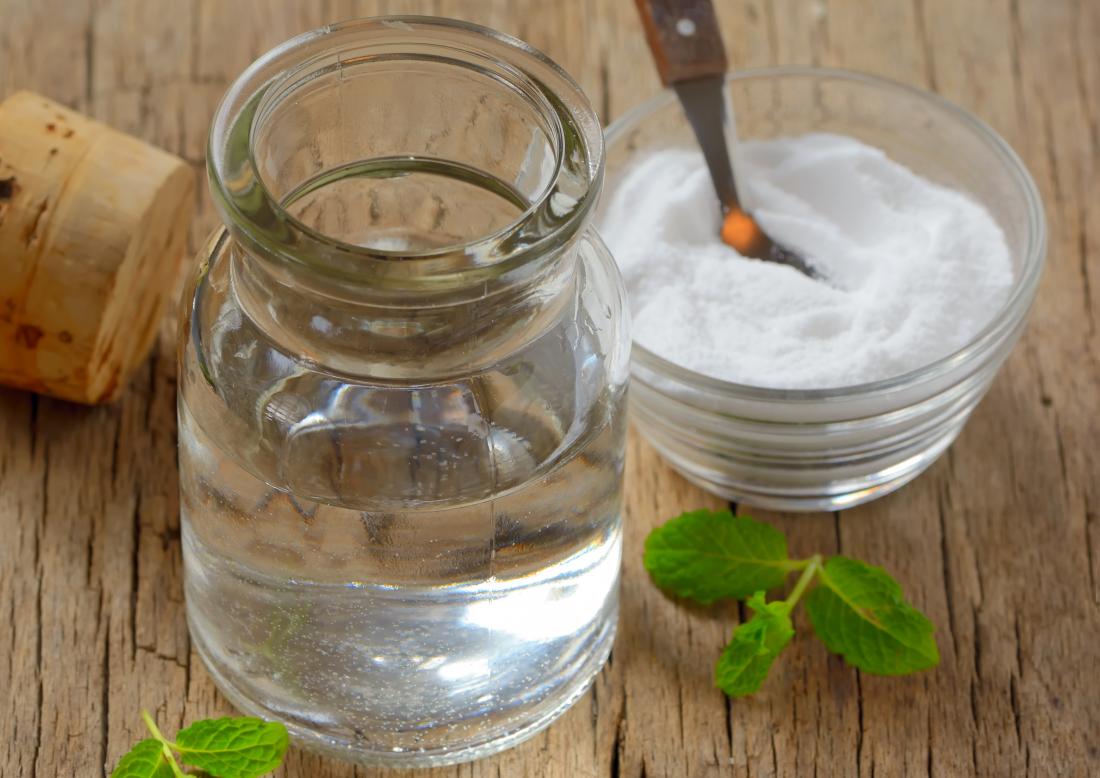While pharmacies and other stores sell medicated mouthwashes and similar products, some people prefer saltwater gargles and other home remedies.
In this article, we discuss what saltwater gargles are and what conditions they can help treat and prevent. We also cover how to make and use a saltwater gargle, as well as risks and considerations.
What is it?

A saltwater gargle is a mixture of salt, water, and baking soda.
A saltwater gargle is a home remedy for sore throats and other causes of mouth pain. Saltwater solutions are a simple mix of water and table salt and can be a cheap, safe, and effective alternative to medicated mouthwashes.
Saltwater solutions are not well studied. A small study from 2010 of 45 children investigated the effectiveness of a saline saltwater gargle and a mouthwash containing alum.
The researchers reported that children who used one of the saltwater gargles twice daily for 21 days had significantly reduced levels of mouth bacteria, compared with children who used a placebo.
However, the saltwater gargle was not as effective at reducing bacteria as the alum mouthwash. Alum, which is potassium aluminum sulfate, is an active ingredient in some medicated mouthwashes.
Doctors and dentists often recommend saltwater gargles to help alleviate mouth and throat pain.
Uses
Saltwater gargles can be effective for treating mild pain, discomfort, and tickles in the mouth and throat. We discuss some of the conditions that saltwater gargles can help treat and prevent below.
Sore throats
Saltwater gargles can be an effective way to relieve discomfort from sore throats.
Both the Institute for Clinical Systems Improvement and the American Cancer Society (ACS) recommend gargling with salt water to soothe sore throats. According to the ACS, regular use of saltwater gargles can help keep the mouth clean and prevent infections, particularly in people undergoing chemotherapy or radiation therapy.
Canker sores
Canker sores are painful ulcers that can develop in the mouth. Gargling with salt water may help ease pain and promote healing of the sores.
Allergies
Some allergies, such as hay fever, can cause a person’s nasal passages and throat to swell, which can be uncomfortable. Though gargling with salt water will not prevent the allergy, it may help alleviate some of the throat discomfort.
Respiratory infections

Gargling with salt water may help relieve the symptoms of the common cold.
Upper respiratory infections are typical and include common colds, the flu, mononucleosis, and sinus infections. Some research suggests that gargling with salt water can alleviate symptoms and even help prevent upper respiratory infections.
For example, a study from 2013 involving 338 participants found that those who gargled with salt water were less likely to have upper respiratory infections.
Dental health
Regularly gargling with salt water can assist in removing bacteria from the gums, which helps in cleaning and preventing the buildup of plaque and tartar. A buildup of bacteria in the mouth can lead to gum disease and tooth decay.
The American Dental Association (ADA) recommend that people gently rinse the mouth with a warm saltwater solution after having a dental procedure. Doing this can help keep the extraction site clean and prevent infection.
Does salt water kill bacteria?
Salt water may kill some, but does not kill all, mouth and throat bacteria. However, solutions of salt can help bring bacteria to the surface of the gums, teeth, and throat. Once the bacteria is brought to the surface, some of it washes away when a person spits the salt water out.
Recipe
Saltwater gargles are easy and cheap to make. The ADA recommend adding half of a teaspoon (tsp) of salt to 8 ounces of warm water, then mixing until they are combined.
An alternative recipe involves adding baking soda to the saltwater solution. For example, the ACS recommend combining the following to make a saltwater gargle:
- 1 qt water
- 1 tsp salt
- 1 tsp baking soda
How to gargle effectively

Gargling for as long as possible can help ensure that the mouthwash is effective.
To use the saltwater gargle:
- Take as much of the solution into the mouth as is comfortable.
- Gargle the salt water around the back of the throat.
- Rinse around the mouth, teeth, and gums.
- Spit out the solution.
A person should try to gargle the saltwater solution for as long as possible. Although the saltwater solution is generally safe to swallow, it is best to spit it out.
For maximum effectiveness, a person should gargle with salt water once or twice a day.
People recovering from dental procedures can use a saltwater solution to rinse their mouth. However, for the first few days, they should rinse very gently to prevent scabs from opening up, and follow the directions from their dental professional.
Risks and considerations
Gargling with salt water is considered safe for both children and adults. However, people who have trouble gargling should not use a saltwater gargle.
Some young children may also not be able gargle effectively. A pediatrician may be able to provide advice on when a child is ready to gargle.
Saltwater gargles are safe to use several times a day if desired, and for most, there are no side effects. People with high blood pressure or those with other medical conditions who need to limit their sodium intake should speak with a doctor or dentist before gargling with salt water.
People who do not like the taste of saltwater solutions can try adding honey or garlic to help improve the flavor.
Summary
Gargling with salt water can help keep a person’s mouth clean and may alleviate pain and discomfort from sore throats, mouth sores, and dental procedures. Saltwater gargles are quick and easy to make and are a cheap and natural alternative to medicated mouthwashes.
A person can safely gargle with salt water several times a day. There are typically no side effects. However, people with high blood pressure or those who need to limit their sodium intake should speak with a doctor before gargling with salt water.
